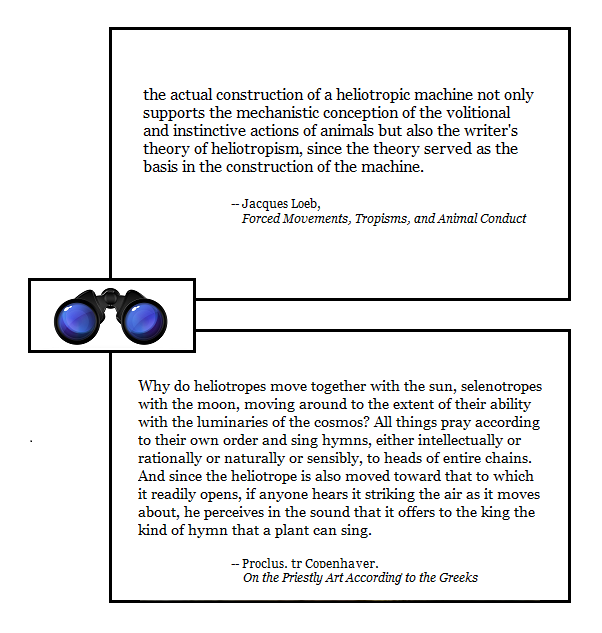Is Poetry plus Science a zero sum game?
[ by Charles Cameron — for Adam Elkus ]
.
A case study in the heliotrope:
Do we gain as much in science as we lose in poetry, when we switch explanatory frameworks?
**
F Scott Fitzgerald:
The test of a first-rate intelligence is the ability to hold two opposed ideas in mind at the same time and still retain the ability to function.
How about holding two explanatory frameworks in mind?
Adam, I think you’re doing something of the sort with qualitative & quantitative approaches, right? And I quote…
The work merges my longstanding interests in intellectual history and qualitative research approaches to studying strategy and decision-making and my technical interests in simulation, modeling, cognitive science, and machine intelligence programming.




January 8th, 2016 at 3:47 am
“You have even less idea what an LISP program based on a cognitive model will do before you run it.”
*
Having used AutoLISP, a dialect of the LISP language, I can understand how this can be. Most likely, unless the list you are processing has footnotes, you would need to be oriented similar to the person who wrote the program.
*
When our local federal government institution was doing an upgrade and found all the computers were reading dos, they found a country that was still using it (Vietnam) and used their people to read the programs.
Perhaps you just need to find a backward enough country to read your LISP programs.
*
I mean LISP just means list-processing, and was developed early-on by MIT to communicate with computers.
*
As an alternative, perhaps you just need to ask some old computers. 🙂
January 8th, 2016 at 4:04 am
“Is Poetry plus Science a zero sum game?”
*
I think you need to define “zero” first.
*
As an example, in physics, zero means one cancels out the other and all forces are equal. In that case, I think you can say that zero means two wholes. In economics zero means less than one, and the equation is binary.So you might say: if the answer is yes, it’s false; if the answer is no, it’s true.
*
So in a qualitative judgement, are we looking for when something is whole or true?
*
What is your orientation?
January 8th, 2016 at 4:32 am
Hi Larry:
.
As I understand and intend it, the phrase “zero sum game” refers to a situation in which whatever is gained by one party in a two-party game or event is offset by a corresponding loss on the other side.
.
Thus my question is whether we gain overall by losing the spiritual beauties of poetic reasoning when we supplant them with the technical practicalities of the sciences..
January 8th, 2016 at 9:02 pm
And the gain is in quality, beautiful body = beautiful spirit? I have found both to be true, at least binary. 🙂
*
So if it comes down to observation, with know your enemy, know yourself–love your enemy, love yourself, as your orientation, then it is about quantity?
*
In other words, in the case of the first equation, the decisions coming out of your orientation are qualitative true in both body and spirit as they are quantitatively true coming out of the second equation, i.e. love your enemy?
*
Is one simply more local, while the other more global?
January 17th, 2016 at 2:58 am
“Thus my question is whether we gain overall by losing the spiritual beauties of poetic reasoning when we supplant them with the technical practicalities of the sciences..”
*
No. There is beauty in both, and beauty is singular. So maybe we have to think of zero as binary and singular? At least one part of it. 🙂
*
If you add potential energy to kinetic energy you get zero. But potential energy is not time based, while kinetic energy is. To quote, wrongly, an online game I once played many years ago, what are the rule-sets, but discovery?
*
My Captain is still my captain. It’s what I have discovered that drives me, ha! Perhaps talk to the First Mate? I have lost contact with the rest of them. Is he, Constitutionally, still happy?